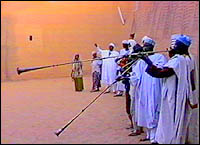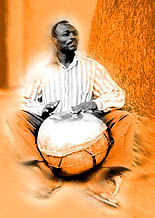
|
|
Court-music instru- ments of the sultan of Damagaram
Niger
Ethnic group: Hausa
Canadian Museum of Civilization
Video Excerpt
|
|

|



This official set of musical instruments is considered noble
because it is used to play the genealogical repertoire that traces the history of
a chiefdom and constitutes the ancient royal music of the Hausa countries. The
instruments are the embodiment of power: the number of horns, drums and double
bells is proportional to the importance of the chiefdom. There can be close to a
hundred of them at important events.
Court musicians sing and play only for members of the royal family or for
a person whose authority is linked to tradition, such as the sultan; the head
of a province, district, village or tribe; and court dignitaries. The musical
ensemble, called the makadan hwada, entertains the court during festivals
and enthronement ceremonies, and on Thursday evenings, before the days of worship.
A piece called Sara, which traces the history of the chiefdom, is played
in honour of deceased chiefs. It is a type of greeting addressed to those in power
and their descendants in the form of instrumental mottos that are also played
during the principal Muslim celebrations (Ramadan and Tabaski) and on national
holidays. This music accompanies the sultan on his travels, heightening his
prestige in other villages or the region.
|







